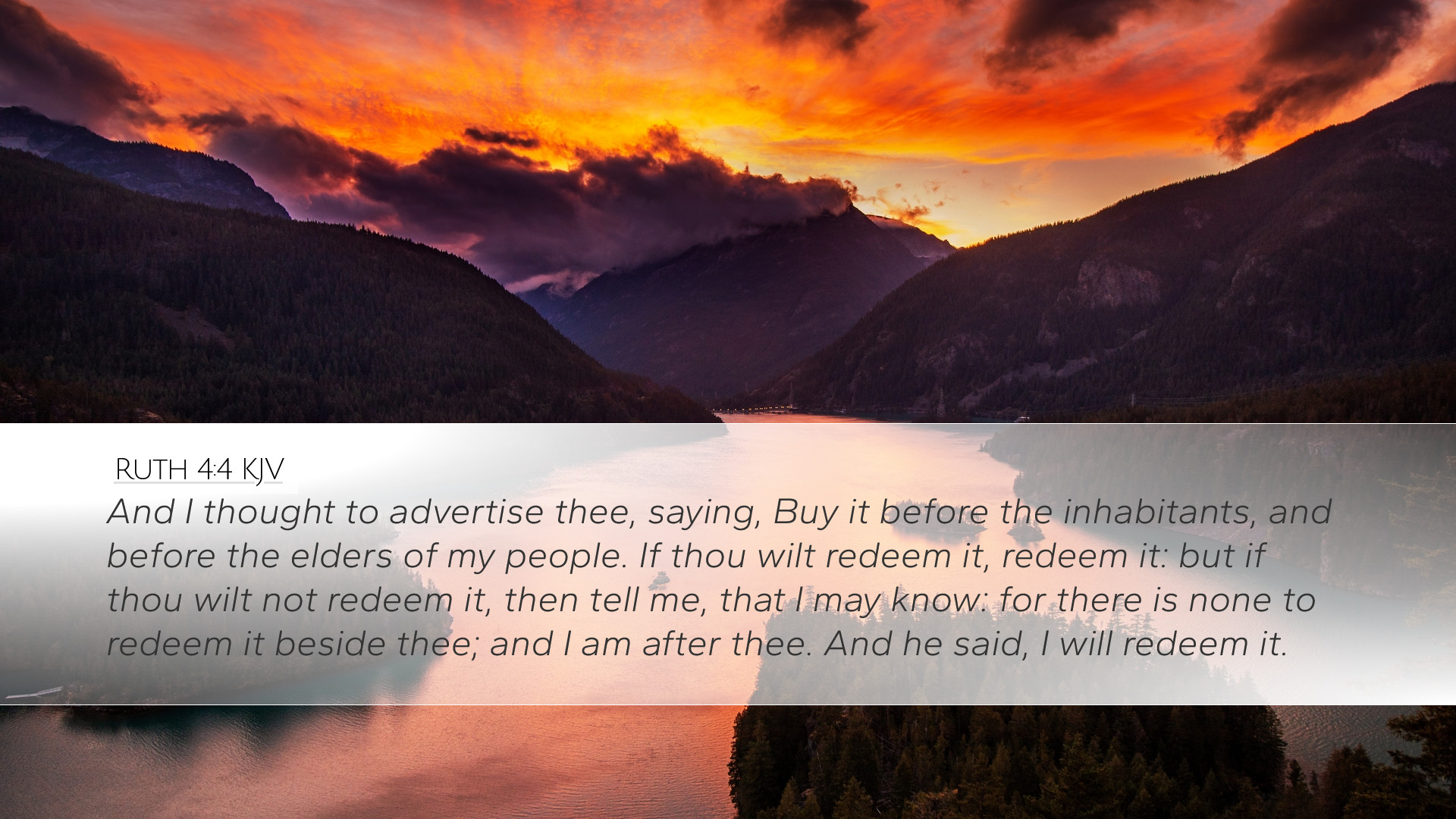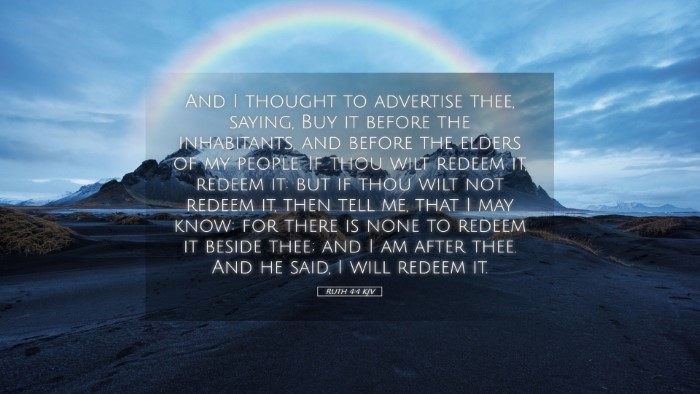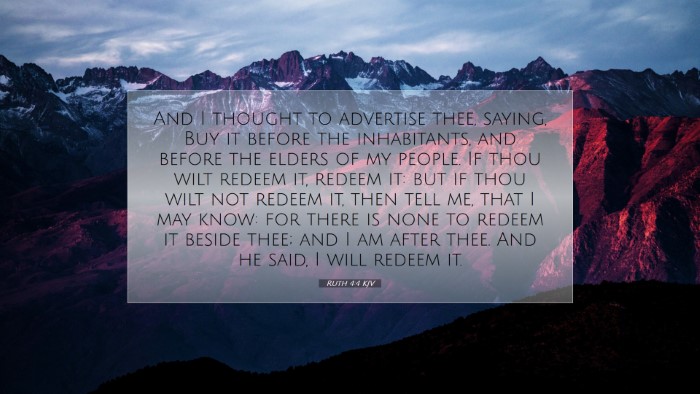Old Testament
Genesis Exodus Leviticus Numbers Deuteronomy Joshua Judges Ruth 1 Samuel 2 Samuel 1 Kings 2 Kings 1 Chronicles 2 Chronicles Ezra Nehemiah Esther Job Psalms Proverbs Ecclesiastes Song of Solomon Isaiah Jeremiah Lamentations Ezekiel Daniel Hosea Joel Amos Obadiah Jonah Micah Nahum Habakkuk Zephaniah Haggai Zechariah MalachiRuth 4:4
Ruth 4:4 KJV
And I thought to advertise thee, saying, Buy it before the inhabitants, and before the elders of my people. If thou wilt redeem it, redeem it: but if thou wilt not redeem it, then tell me, that I may know: for there is none to redeem it beside thee; and I am after thee. And he said, I will redeem it.
Ruth 4:4 Bible Commentary
Commentary on Ruth 4:4
Ruth 4:4 states:
"And I thought to advertise thee, saying, Buy it before the inhabitants, and before the elders of my people. If thou wilt redeem it, redeem it: but if thou wilt not redeem it, then tell me, that I may know: for there is none to redeem it beside thee; and I am after thee." (KJV)
Contextual Understanding
The Book of Ruth is a rich narrative that underscores themes of redemption, loyalty, and divine providence. The events in chapter 4 occur after Ruth has gleaned in Boaz's field, leading to a series of actions that culminate in her being redeemed as well as the lineage of David being established through this union. The mention of redeeming property speaks to the kinsman-redeemer role outlined in Leviticus 25, which highlights the importance of lineage and inheritance in Israel.
Exegesis of Ruth 4:4
In this verse, Boaz speaks to the nearer kinsman regarding the redemption of Naomi's land. The act of redemption is not merely a transaction but involves a relational responsibility.
- Advertisement of Redemption: The phrase "I thought to advertise thee" indicates that Boaz is proactive in offering the opportunity of redemption. This showcases Boaz’s character as honorable and just.
- Public Witness: The involvement of "the inhabitants" and "the elders" highlights the public nature of this transaction, ensuring accountability and communal recognition of the actions taken.
- Conditional Offer: Boaz places the kinsman in a position to either accept or decline the responsibility. This illustrates the principle of free will in the process of redemption.
- Lineage and Continuity: The urgency in the statement "I am after thee" speaks to the importance of maintaining lineage in Israel's covenantal history.
Insights from Commentaries
Matthew Henry’s Commentary
Henry emphasizes the importance of kinsman-redeemer, noting that Boaz is fulfilling this role both legally and morally. He interprets the dialogue as illustrating the unfolding of God’s providence, indicating that every step was directed towards not only the redemption of property but also the broader redemption plan through Christ.
Albert Barnes’ Notes
Barnes notes that this verse reflects a culture of responsibility and communal integrity. He points out that the process of redemption was not undertaken lightly, as it came with the obligation to care for the widow as well as her deceased husband's estate. Barnes contextualizes Boaz’s appeal as a model for leadership that involves transparency and integrity.
Adam Clarke’s Commentary
Clarke provides a deeper insight into the social customs of the time, explaining how Levirate marriage practices ensured that family lines continued. He stresses that Boaz's actions are emblematic of loyalty to family obligations, and his approach in negotiating for Ruth is characterized by both respect and wisdom.
Theological Implications
Ruth 4:4 can be seen as a typological foreshadowing of Christ's redemptive work. Just as Boaz lays out the conditions for redemption, Christ, as our ultimate kinsman-redeemer, provides the path for salvation. The communal aspect of the elders witnessing this transaction represents the broader witness of the Church to Christ’s redemptive work in our lives.
Practical Applications
For pastors and theologians, this verse offers rich material for preaching on the themes of redemption and community responsibility. Here are some practical applications:
- Honoring Relationships: Just as Boaz honors his relationship with Naomi and Ruth, leaders today must commit to honoring and supporting the relational dynamics within their congregations.
- Transparency in Leadership: The public announcement of the offer of redemption speaks to the need for transparency and accountability in leadership matters, fostering trust within the community.
- Responses to God's Call: The invitation to redeem urges believers to respond actively to God's call in their lives, considering what responsibilities God may be placing upon them.
Conclusion
Ruth 4:4 serves as a foundation for understanding the intricacies of God’s plan for redemption, both in the context of Israel and in the broader narrative of Scripture. It calls each believer to consider their role as kinsman redeemers in their communities—action motivated by love and grounded in the redemptive work of Christ.


